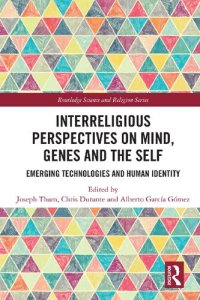
Ebook: Interreligious Perspectives on Mind, Genes and the Self: Emerging Technologies and Human Identity
- Series: Routledge Science and Religion Series
- Year: 2018
- Publisher: Routledge
- Language: English
- pdf
Attitudes towards science, medicine and the body are all profoundly shaped by people’s worldviews. When discussing issues of bioethics, religion often plays a major role. In this volume, the role of genetic manipulation and neurotechnology in shaping human identity is examined from multiple religious perspectives. This can help us to understand how religion might affect the impact of the initiatives such as the UNESCO Declaration in Bioethics and Human Rights.
The book features bioethics experts from six major religions: Buddhism, Confucianism, Christianity, Islam, Hinduism, and Judaism. It includes a number of distinct religious and cultural views on the anthropological, ethical and social challenges of emerging technologies in the light of human rights and in the context of global bioethics. The contributors work together to explore issues such as: cultural attitudes to gene editing; neuroactive drugs; the interaction between genes and behaviours; the relationship between the soul, the mind and DNA; and how can clinical applications of these technologies benefit the developing world.
This is a significant collection, demonstrating how religion and modern technologies relate to one another. It will, therefore, be of great interest to academics working in bioethics, religion and the body, interreligious dialogue, and religion and science, technology and neuroscience.
The book features bioethics experts from six major religions: Buddhism, Confucianism, Christianity, Islam, Hinduism, and Judaism. It includes a number of distinct religious and cultural views on the anthropological, ethical and social challenges of emerging technologies in the light of human rights and in the context of global bioethics. The contributors work together to explore issues such as: cultural attitudes to gene editing; neuroactive drugs; the interaction between genes and behaviours; the relationship between the soul, the mind and DNA; and how can clinical applications of these technologies benefit the developing world.
This is a significant collection, demonstrating how religion and modern technologies relate to one another. It will, therefore, be of great interest to academics working in bioethics, religion and the body, interreligious dialogue, and religion and science, technology and neuroscience.
Download the book Interreligious Perspectives on Mind, Genes and the Self: Emerging Technologies and Human Identity for free or read online
Continue reading on any device:

Last viewed books
Related books
{related-news}
Comments (0)